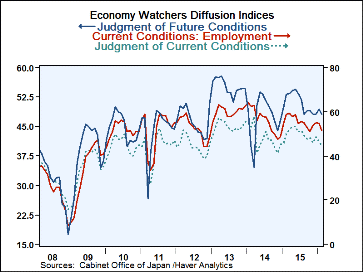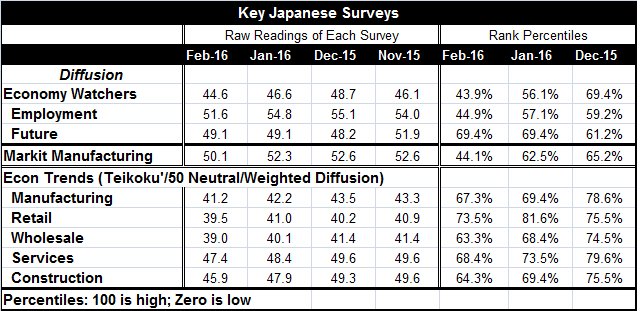 Global| Mar 08 2016
Global| Mar 08 2016Japan's Economy Watchers Index Shows Erosion
Summary
Japan's economy watchers index is lower month-to-month with its employment conditions index sinking and the future index unchanged. This index is geared to track the goings on in the services sector in Japan. The rank standing of the [...]
 Japan's economy watchers index is lower month-to-month with its employment conditions index sinking and the future index unchanged. This index is geared to track the goings on in the services sector in Japan. The rank standing of the index is in its 43.9 percentile in February, which weak and below its historic median (which occurs in the 50 percentile rank). That standing fell sharply from 56.1% in January. The employment index's current standing is in its 44.9 percentile after a much stronger 57.1 percentile standing a month earlier. The future index is unchanged on the month and has a higher, 69.4 percentile standing. Still, this is a report that is mostly weak with slipping momentum except for the future index.
Japan's economy watchers index is lower month-to-month with its employment conditions index sinking and the future index unchanged. This index is geared to track the goings on in the services sector in Japan. The rank standing of the index is in its 43.9 percentile in February, which weak and below its historic median (which occurs in the 50 percentile rank). That standing fell sharply from 56.1% in January. The employment index's current standing is in its 44.9 percentile after a much stronger 57.1 percentile standing a month earlier. The future index is unchanged on the month and has a higher, 69.4 percentile standing. Still, this is a report that is mostly weak with slipping momentum except for the future index.
The Markit manufacturing survey also is updated through February and it slipped to 50.1 from January's 52.3. That index has a 44th percentile queue standing and has been slipping. Japan does not have a lot of strength.
The Teikoku indices give activity readings for various sector indices. However, only retailing significantly surpasses its two thirds standing in its historic queue of observations since 2008. Monthly all five sectors took a step-back in February. Four of five sectors weakened in January as well. All sectors are lower compared to their standing of four months ago. In the Teikoku framework, manufacturing has slipped as much as any sector over three months, but all sectors are lower on balance over three months. The manufacturing sector has fallen from a 78.6th percentile standing in December to a standing of 67.3% in February; that's a big slip and it is matched by the drops in wholesaling, services and construction. Retailing has held up much better with a percentile drop over three months of just 2 points.
Japan also reported out weaker consumer confidence today in the cabinet office survey. That diffusion index gauge fell to 40.1 in February from 42.5 in January. Confidence is low and sinking again. Despite moves by the BOJ, confidence simply has not been boosted or stabilized. The BIS has cast some doubt on the efficacy of negative interest rate policy. The BOJ has said it is going to study the issue while the program is in place, presumably before considering stepping it up.
Japan's largest trading partner is China. There is more bad news there today as Chinese exports fell by 25% in February, their largest year-on-year drop since May 2009. The shift in the timing of China's New Year is to blame and we have seen this before. Usually a drop in this circumstance is not a meaningful event. The timing of China's New Year has a huge impact on activity, especially on trade flows in China. Still, the outsized nature of this drop suggests that there may be more at work here than just a shift in the timing of the New Year. China has been struggling.
On balance, there is still a good deal of global weakness afoot and Japan is plugged into the global economy. In Germany, there was good news as unseasonable weather apparently was responsible for the fastest IP expansion in six years. This certainly breaks the mold with past trends for Germany that have been showing weakness. But France shows a larger trade deficit. Spain, the fourth largest euro area economy, demonstrated a slowing in industrial output, in contrast to Germany. Worldwide economic data continue to run mixed. But Japan's trends remain mostly weaker and Asia seems to be the epicenter of the global slowdown.

Robert Brusca
AuthorMore in Author Profile »Robert A. Brusca is Chief Economist of Fact and Opinion Economics, a consulting firm he founded in Manhattan. He has been an economist on Wall Street for over 25 years. He has visited central banking and large institutional clients in over 30 countries in his career as an economist. Mr. Brusca was a Divisional Research Chief at the Federal Reserve Bank of NY (Chief of the International Financial markets Division), a Fed Watcher at Irving Trust and Chief Economist at Nikko Securities International. He is widely quoted and appears in various media. Mr. Brusca holds an MA and Ph.D. in economics from Michigan State University and a BA in Economics from the University of Michigan. His research pursues his strong interests in non aligned policy economics as well as international economics. FAO Economics’ research targets investors to assist them in making better investment decisions in stocks, bonds and in a variety of international assets. The company does not manage money and has no conflicts in giving economic advice.






